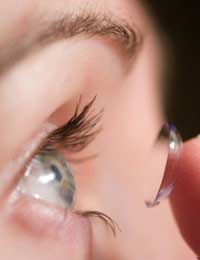Types of Contact Lenses

Contact lenses are now more popular than ever. The Association of Contact Lens Manufacturers estimates there are now more than 3.3 million people in the UK wearing contact lenses.
There are different types of lenses available for different eye problems, but they generally fall into two categories of hard and soft lenses. Almost anyone can wear contact lenses although special care is needed for children and older people. Contact lenses can treat short sightedness and long sightedness. There are also lenses available for astigmatism and presbyopia.
Contact lenses are held in place by the tears in the eye between the lens and the front of the eye. Most contact lenses are worn on a daily basis and they should not be worn overnight. In some cases your optician may advise you that it is safe to wear your lenses when sleeping but check if you are not sure.
After an eye examination, which includes checking your eyes are suitable for contact lenses as well as eye problems and the early signs of eye disease, your optician will fit the lenses. They will check that your tears are a good quality to ensure that the lenses are kept lubricated. They will also measure the size of your cornea, the pupil and the position of your eyelids to ensure the correct size lenses are fitted.
Soft Contact Lenses
Soft lenses are made from oxygen permeable plastics which become pliable during manufacturing. They contain between 30 and 40 per cent water and are very comfortable to wear, as well as being easy to fit.Astigmatism, where the shape of the cornea causes distorted eyesight, can be treated with ‘toric’ contact lenses. Bifocal contact lenses are used to treat presbyopia, when a person has difficulty seeing close up particularly when reading. This condition was traditionally treated by wearing reading glasses for close up tasks but now bifocals ensure the person can see objects in the distance and as well as for reading.
Hard Lenses
When contact lenses were first developed they were hard lenses. These lenses didn’t allow for oxygen to pass through the lens to the cornea. As they needed to be very small to leave the cornea uncovered as much as possible, they could easily fall out especially when blinking. Although these are still available for certain specialist needs they have largely been replaced by rigid gas permeable lenses.Rigid Gas Permeable (RGP)
These lenses combine the functions of both hard and soft lenses. These are firmer than soft lenses but are made of oxygen permeable plastic. RGP lenses usually last longer than soft lenses and are very hard-wearing. Some prefer to wear these lenses as they are easier to handle than soft lenses. People with a high level of astigmatism are often prescribed RGP lenses. Once a person has got used to the lenses they are generally just as comfortable to wear as soft lenses.Disposable Lenses
Disposable lenses are very popular especially with those who have a busy lifestyle. There is no need to look after the lenses as they are replaced each day with new lenses and the old lenses are thrown away. It is also means you do not have to worry about losing a lens. The cost of disposable lenses is very comparable to other lenses. They are often not any more expensive than non-disposable lenses. Your optician will advise you how often you need to replace the lenses. This can vary from daily replacement to a much longer period.- Pros and Cons of Coloured Contact Lenses
- Why Did I Wait So Long to Get Varifocals?
- Designer Glasses: Are They Worth It?
- Glasses or Contacts? How to Choose
- Contact Lens Trials Explained
- Travelling with Contacts and Glasses
- Using Contact Lenses
- Types of Glasses Lenses
- Types of Sunglasses
- Picking Suitable Frames
- Glasses or Contacts?


Re: What is Vitrectomy Surgery?
I had vitrectomy 4 weeks ago. The surgery was not well done as apparently bleeding occurred. The hole did not close despite having…
Re: Glasses or Contacts?
I need a eye exam and new glasses it's been since 2013/ I have no income I lost my boyfriend last September and I've been homeless ever…
Re: Eyewear for the Partially Sighted
This extract from your text is not clear and the grammar is poor- and the letters in the validation box are mixed…
Re: Eye Cancer Symptoms
I have yellow in both eyes lools like 2 dots. But looks like its makin the white part of my eye yellow whats wrong with me
Re: Are my Glasses Affecting my Eyes?
Hi, Please can anyone give advice on wearing varifocals. After a short while I develop a severe ache in my left eye and…
Re: Are my Glasses Affecting my Eyes?
On wearing my new varifocals, I am finding that my left eyeball hurts so much it feels like it will explode after 15…
Re: What is the Cause of my Itchy Eye?
I have One and only One itchy eye that has been going on 24/7 for 5 weeks.Eye is not swollen vision not affected. Eye doc…
Re: Contact Lens Trials Explained
Hi, We wanted to get in touch with you to increase traffic on your website. Please reply to this email so we can send you free…
Re: What Are Photoreceptors?
I have a 10 year old grandson who was diagnosed at apx 2 with cone and rod dystrophy eye disease. Please help with any treatment…
Re: Driving and Eyesight
Danny6520 - Your Question:Hi,I am only 16, but soon I will be 17and I am hoping to drive. However I have a few problems. Firstly, I am…